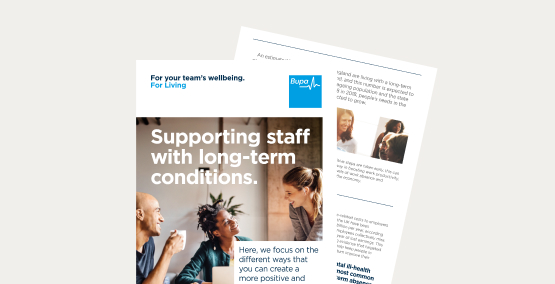Rethinking chronic mental ill-health
Supporting employees with chronic mental health conditions
Much of the focus for mental health in the workplace is around mild to moderate episodes of conditions such as anxiety, stress or depression. But long-term mental health conditions, such as bipolar disorder or a psychotic disorder such as schizophrenia receive far less attention, and these can have a devastating impact on people's careers and ability to participate fully in the workforce.
The figures on long-term mental health conditions speak for themselves. The most recent official statistics found that 2% of adults were bipolar, 3.7% of men and 5.1% of women suffered from PTSD, and 0.7% had experienced a psychotic disorder such as schizophrenia in the previous year.1 Studies also show that 30% of people who suffer from depression will experience depressive symptoms for at least two years.2
The impact of these long-term conditions on people's careers is significant. Research by NICE estimated that just 5–15% of people with schizophrenia are in employment, and people with severe mental illness (including psychosis and schizophrenia) are six to seven times more likely to be unemployed than the general population.3
Glenys Jackson, Bupa Clinical Lead for Mental Health, believes that with the right support and understanding, employees with these conditions can bring enormous benefits to organisations. And what might be perceived as a challenge, should be embraced as an opportunity.

Glenys Jackson
Clinical Lead for Mental Health, Bupa
Knowledge and experience
Glenys explains, “If you have a long-term chronic mental health condition, you're probably between the ages of 30 and 60, so you already have a wealth of knowledge and experience of life. And someone who has lived experience of managing a moderate to severe mental health condition has potentially developed constructive coping strategies to manage changes they experience, which develops alternative connections within the brain, in terms of how they think and how they feel. These are great transferable skills when you're looking at change management in businesses.”
We are all familiar with the idea that there are positives to having a mind that works differently, and thinking outside the box can be a driver for innovation and business success.
Sir Richard Branson famously described his dyslexia as an “exceptionality” which contributed to his success.4 Bipolar disorder has long been associated with increased creativity.5 And a recent American study found 72% of entrepreneurs were affected, directly or indirectly, by mental health differences and concluded “these conditions may foster the pursuit of entrepreneurship”.6

Specific strengths
The researchers added, “Understanding, exploiting, and managing the specific strengths and vulnerabilities associated with specific psychiatric conditions can contribute to improved entrepreneurship education, executive coaching, business outcomes, and firm survival.”
Glenys says the first step is to make sure employees know that support is available and they have the confidence and trust to access it. “From my experience, I know that many people with a significant mental health condition are reluctant to share that information with their employees.”
Signs and symptoms
“There are always signs and symptoms — such as sickness absence, or somebody is not concentrating, not hitting deadlines. There will be times when we all have too many plates to spin, but when people are saying, ‘I’m sorry, I have not got that finished’ on a consistent basis, there is likely to be an underlying issue” says Glenys.
“That’s why it is important to have a robust mental health wellbeing programme, and ensure that line managers have the confidence and skills they need to identify when someone is struggling, and have that initial conversation.”
“The worst question a manager can ask is, ‘Are you OK?’, because the majority of us will just say, ‘Yes’.”
Structured conversations
“It’s about having a more structured conversation. You might say, ‘I’m a little bit concerned because I’ve noticed a change in you.’ Or, ‘I know we’ve all got a lot going on at the moment, but I just wanted to check in with you.’ It’s just a different way of saying ‘Are you OK?’ but you are doing it in a way where you will get a more detailed response.”
Chronic mental health conditions are complex, and can be impacted by work, so it is also important for employers to understand an individual’s triggers. Is there a pattern to someone’s resilience becoming low? What are the triggers? Stress, deadlines, meeting expectations, can all be factors — but these will vary and one person’s stressor can be another’s support.
“Another trigger is change, especially with some of the more complex mental health conditions, such as personality disorders.”

Minimising absence
Being alert to potential triggers, managing them, and making sure employees with chronic mental health conditions can access therapy and other interventions quickly and simply can help to avert acute episodes and minimise absence.
This is reflected in the ongoing support Bupa is able to provide. Glenys explains, “We don’t know when these flare-ups are going to occur, so it's important for employees to use the support around them, or have that opening conversation with a Mental Health first aider. If available, they can also link in with the Employee Assistance Programmes which ensures employees can contact mental health practitioners directly, to arrange a review of their mental health wellbeing.”
The Mental Health Hub helps employees explore their mental health wellbeing remotely, and this can be a starting point for more structured support and therapy.
Visit hub

Value of lived experience
Glenys is passionate about the benefits support for staff with chronic mental health conditions will bring, pointing out that successful teams are built on a broad range of skills and strengths. “People with lived experience of a chronic mental health condition can bring the additional strength of compassion and they can be really good at getting things right in terms of how we support teams.
“Someone who has learnt to make significant changes to their own life may be better able to bring that breadth and depth of knowledge into the workplace.”
Supporting you

Supporting staff with long-term conditions:
a manager’s guide

Empower your team to open up and make mental health a conversation topic at work
1 https://researchbriefings.files.parliament.uk/documents/SN06988/SN06988.pdf (PDF 2.4MB)
2 https://bmcpsychiatry.biomedcentral.com/articles/10.1186/s12888-020-2460-5
3 https://www.nice.org.uk/guidance/qs80/chapter/quality-statement-5-supported-employment-programmes
4 https://www.virgin.com/branson-family/richard-branson-blog/exceptionalities-should-be-celebrated
5 https://www.annualreviews.org/doi/10.1146/annurev-clinpsy-050718-095449
6 https://link.springer.com/article/10.1007/s11187-018-0059-8
Bupa health insurance is provided by Bupa Insurance Limited. Registered in England and Wales No. 3956433. Bupa Insurance Limited is authorised by the Prudential Regulation Authority and regulated by the Financial Conduct Authority and the Prudential Regulation Authority. Arranged and administered by Bupa Insurance Services Limited, which is authorised and regulated by the Financial Conduct Authority. Registered in England and Wales No. 3829851. Registered office: 1 Angel Court, London EC2R 7HJ
Bupa Health Trusts are administered by Bupa Insurance Services Limited. Registered in England and Wales No. 3829851. Registered office: 1 Angel Court, London EC2R 7HJ © Bupa 2025


